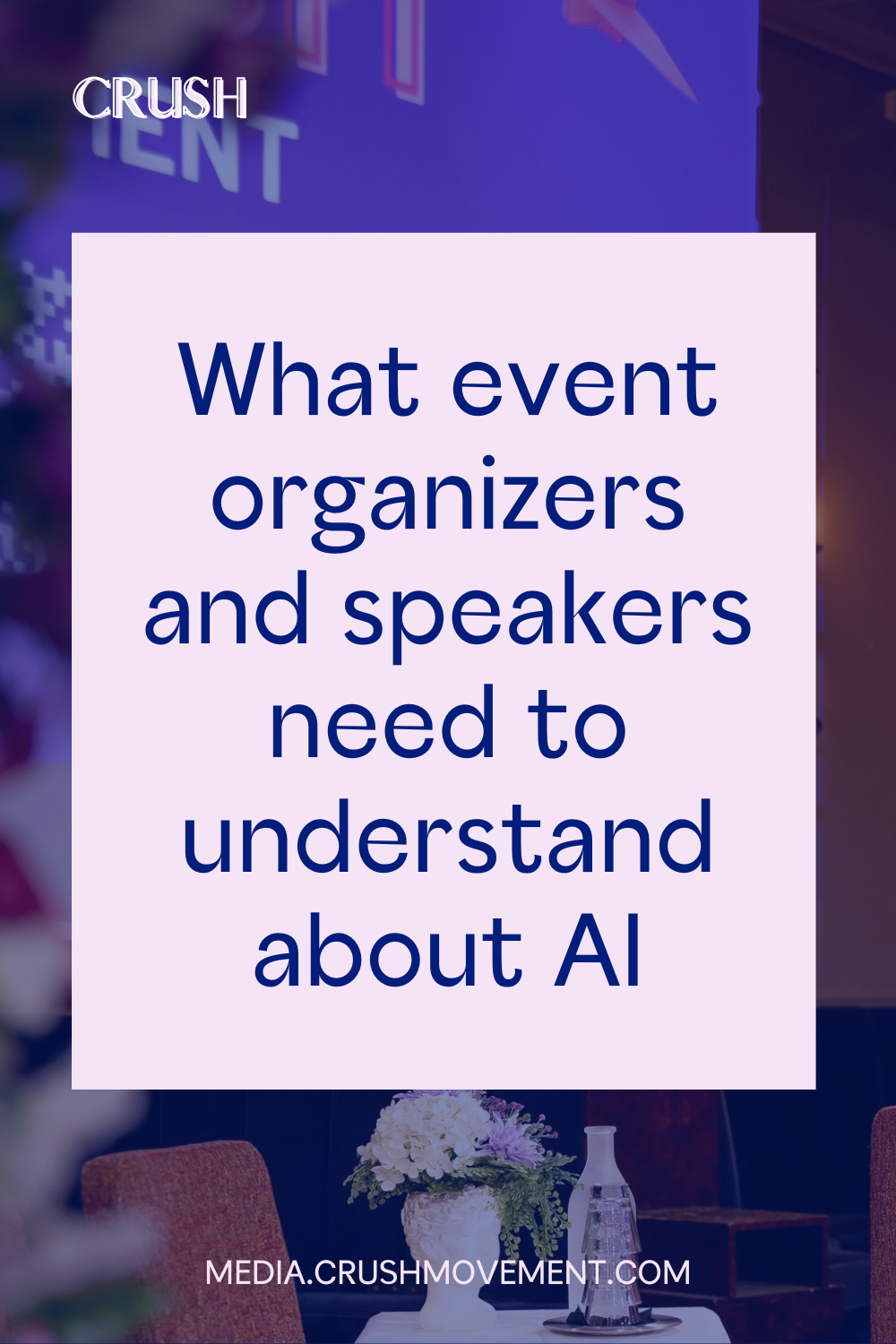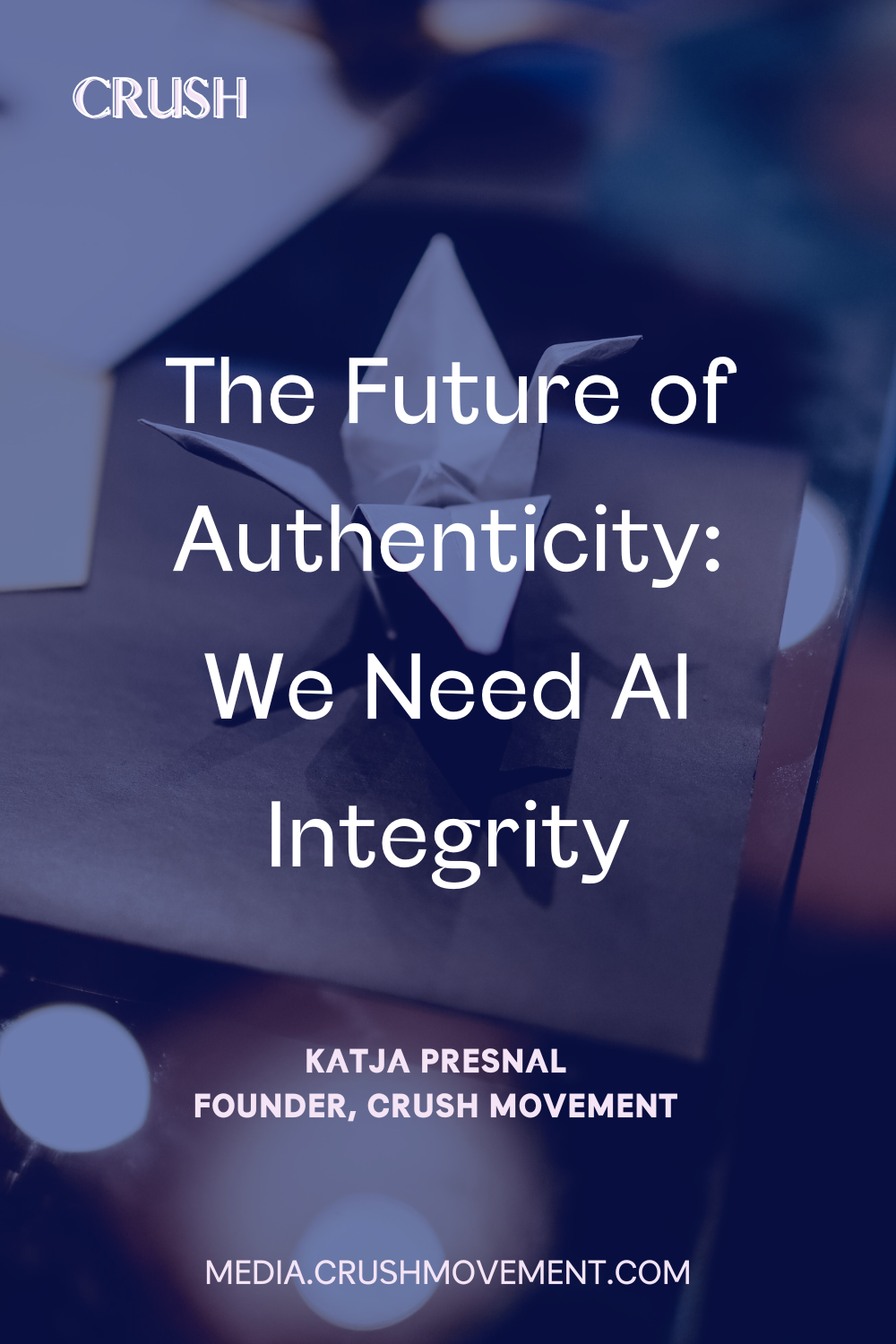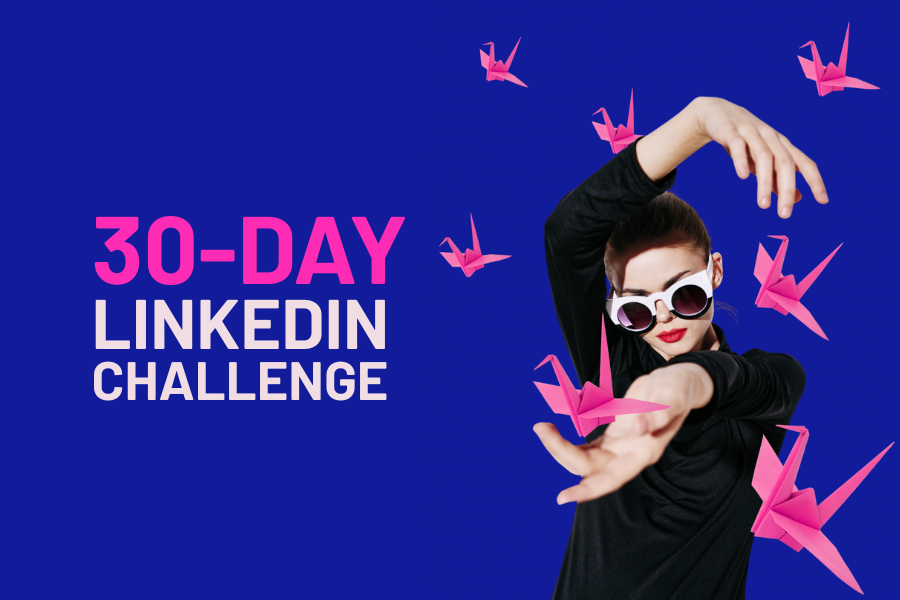

When people ask me what I do at Crush, I say I kick doors open and amplify voices.
When I think of the “amplify voices” part, it would be easy as a marketing person to think the most important part is the “amplify” part. And it tracks with what our community wants the most: visibility.
Essi Koski-Lammi asks what you would do with the visibility and encourages you to look within first.
Visibility without your true voice means nothing. We can’t focus on amplifying until we have a clear voice.
It’s a sign of our times that some of the biggest trends I see in personal branding, building and finding your voice are:
1. Hiring ghost writers. So someone else can write what you actually mean.
2. Having coaches who help you to be more authentic. Because you have lost connection to yourself.
3. Using AI to write text that somehow sounds like you. So you can pretend you wrote it.
I'm not judging. Just stating a fact.
Earlier this year, we were in a studio taking photos of our advisory board, but two of our advisory board members were unable to attend. It was amazing enough that we got seven out of nine power women in the same room, with everyone’s busy schedules.
We took a few photos with specific empty spots in mind, where we could edit the missing people in the image. The whole thought made us laugh, and we never actually manipulated the photos - it just didn’t feel right.

Thanks to AI, we wouldn't have even needed to book a studio, a photographer, a makeup artist, or ask all of our advisory board members to come.
We could have just used their photos, decided on the color scheme of everyone’s clothing, and the level of professional makeup and hair, and created the image using AI.
Instead of doing video interviews with everyone, we could have simply written a script (enhanced by AI, of course) and turned the photos into speaking head videos.
We had over 30 speakers at the Crush event this year. What if we had done the same with all of our speakers’ photos, too?
Easy. And inexpensive!
Also, easily brand consistent with our event branding.
I was in a business event with a specific theme, and noticed that many experienced speakers, whom I had expected to speak from their memory, were reading their speeches from note cards. That’s all right.
But then I started listening better and realized a few of them were sounding very similar, and the speeches were pretty clearly AI-written. Is this what we want?
Already now, we as an audience think the best speakers are charismatic, and they know how to perform the speech, instead of those whose subject matter, knowledge, or ideas are the most thought-provoking.
There are speaker training programs, confidence coaching, and last spring, I even attended an acting class that was meant for speakers to gain confidence on the stage (it was excellent). As someone who has had serious stage fright, all of these have been incredibly helpful for me. And I highly recommend all of these types of training programs.
But… Is the future of speaking increasingly more focused on the performance of speaking, not the topic, now that speech writing is outsourced to artificial intelligence?
Whose voice are we then amplifying?
When we were naming Crush years ago, we knew we wanted “an additional word” to be combined with “Crush”. We landed on “movement” because we wanted to start a ripple effect, we wanted people to feel like this was just another event.
“Movement” signifies that you need to take action, and Crush isn’t really anything if you don’t. “Movement” also communicates the flow in our community, and now in our membership. The more you give, the more you get.
Somehow, in the past years, “movement” became a word AI loves.
“We are not building a plumbing company, we are building a movement of people not having overflowing toilets.”
Ok then.
Honestly, the AI shit is already overflowing our social media toilets, and now also in the event industry, even though events were supposed to be where we “cultivate meaningful real relationships.”
Meaning that we are real, talk like humans do, and we feel all the feelings.
Do we need events when your face, voice, and presence can now be captured, cloned, and “enhanced” with a few clicks? And you can create your digital clone to deliver even your entire speech?
What if in the future, “you” will be headlining a virtual event, without your knowledge or permission?
Recently, digital marketing leader Mari Smith and attorney Mitch Jackson shared a crucial document for speakers, encouraging speakers to add a no AI manipulation clause for all speaker contracts: Artificial Intelligence, Image, and Likeness Protection Clause for Speakers & Presenters.
It’s a simple but powerful addition to any speaker contract.

The event organizers today are not acting maliciously, they often believe they’re helping.
They might want to “polish” a video for social media, adjust colors with AI, or generate a snippet that feels more dynamic and clickable. This will help to sell the tickets to see the real you, right?
But something deeply human gets lost.
Imagine delivering a heartfelt keynote, and then seeing an AI-edited clip where your words were slightly altered, your pauses shortened, your smile digitally “corrected.” Maybe even a few sentences generated to make the story “stronger.”
You didn’t say those words. But they’re being shared under your name, your face, your brand.
The danger isn’t technology itself, it’s the death of trust and authenticity in our communication. And when you build your career on credibility and connection, trust and authenticity are everything.
How will we know where authenticity ends, and where "enchantment" or fake starts?
In Inka Vuorinen’s article, AI Is Underhyped, they explored how the real potential of artificial intelligence lies not in replacing humans, but in expanding human creativity, visibility, and impact.
But that potential only works when there are boundaries.
When speakers and creators clearly communicate what’s acceptable and what’s not.
When event organizers understand that using AI with permission is collaboration, but using it without permission is exploitation.
When speakers understand that using AI to explore ideas, find data, or make better sentence structures is editing, but using it to write their entire speech is not authentic and against human creativity.
AI can do a lot, but it should never speak for you or as you.
NOW is the time to draw the contracts, and build the boundaries.
Including an AI Image and Likeness Protection Clause in your contract does more than protect your legal rights. It opens an important conversation, maybe one that many event hosts haven’t realized they need to have yet.
Here’s what the clause does:
AI isn’t going anywhere.
It’s already part of every creative and professional workflow in events, from writing and design to event production. But as it integrates deeper into how we communicate, the responsibility to define ethical boundaries grows, too.
We need rebel leadership to use AI in an ethical way that doesn’t just amplify a modified message, but preserves and helps you to use your voice better.
We need AI integrity.
The more we use AI responsibly, the more powerful it becomes as a tool for empowerment rather than imitation.
It can free us to focus on the work only we can do.
Ask yourself: how do you protect yourself, your real image, your voice, your truth?
And are you building a legacy of you, or simply an enhanced version of you that will be forgotten?

Read the full Artificial Intelligence, Image, and Likeness Protection Clause for Speakers & Presenters shared by Mari Smith and attorney Mitch Jackson.
And for a deeper look at how AI can still be a creative ally, read AI Is Underhyped by Inka Vuorinen, and then listen to the 4-minute-long healing message by Essi Koski-Lammi to listen your inner voice, before you even start amplifying anything.
Founder of Crush Movement. An award-winning marketing strategist and digital pioneer who built her career as a global nomad, helping Fortune 100 brands and entrepreneurs grow and break sales records. A bestselling author and keynote speaker, her work has been featured in Forbes, The New York Times, and MTV3.
A 30-day challenge designed for authentic thought leaders who want to become unignorable on LinkedIn.Build trust, master storytelling, and attract the right audience without relying on AI or clickbait hacks.Includes 28 emails with over 100 customizable post ideas, helping you show up confidently, optimize your profile, and grow your credibility, engagement, and sales.
